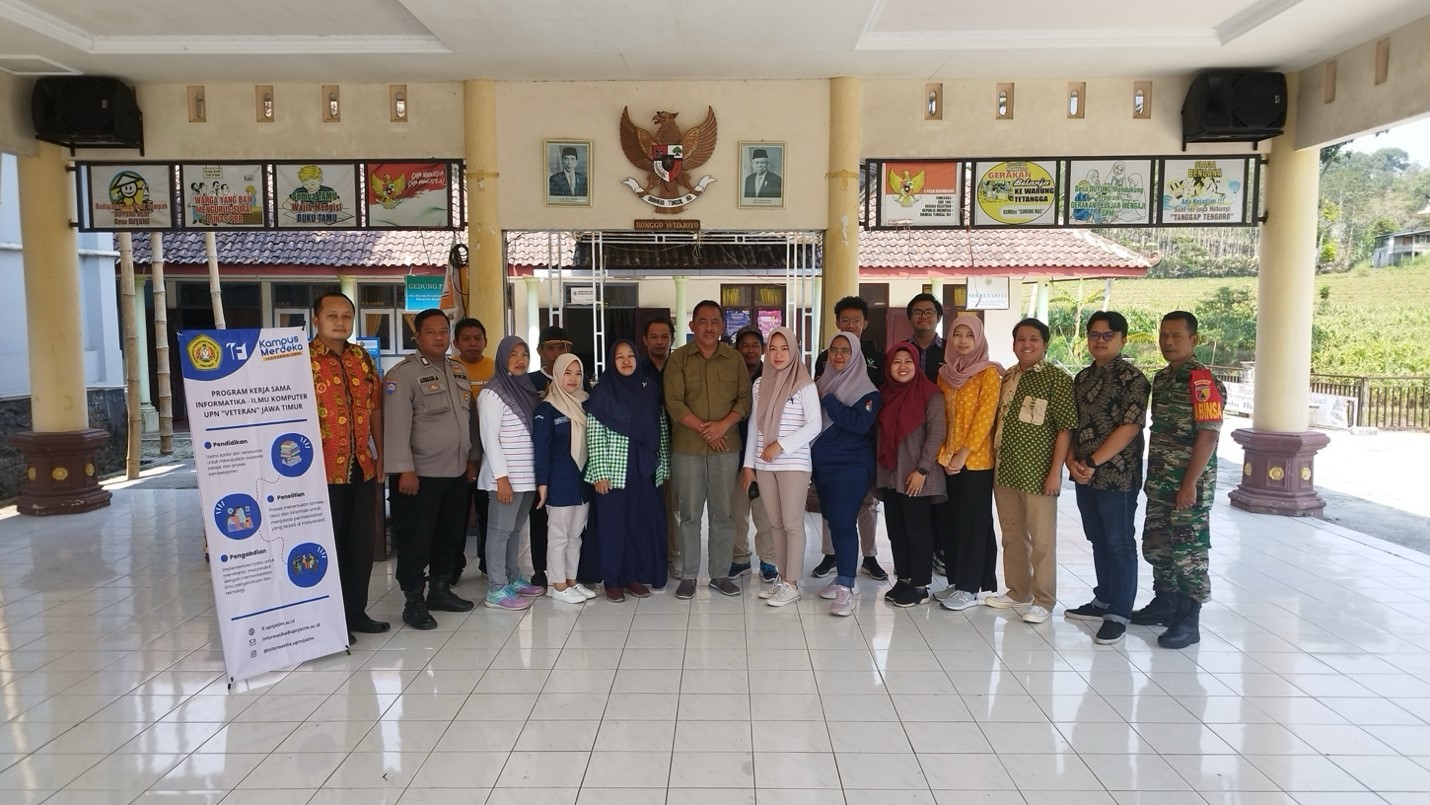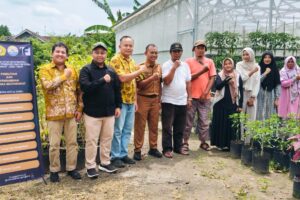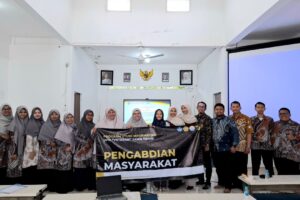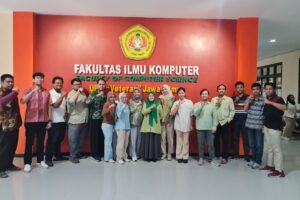
FOCUS GROUP DISCUSSION WITH SEVERAL BUSINESS AND INDUSTRY PARTNERS
- Business Partner of Software House CV. EDUSUPE
Participants:
a) Representative of Informatics Study Program
b) Development Team from CV. EDUSUPE
Agenda:
Synchronization and development of Informatics Study Program curriculum based on the needs and trends of the software industry (software house), as well as the potential for collaboration in developing student competencies.
Main Discussion Points:
- Competency Needs in the World of Work (Software House)
a) Industry requires a ready-to-use workforce who master the latest technology and tools.
b) Web and mobile development skills, use of popular frameworks (React, Laravel, Flutter, etc.), and agile project management are highly needed.
c) The importance of team communication skills, understanding client needs, and writing technical documentation is emphasized. - Input on the Informatics Curriculum:
a) The need for curriculum adjustments by adding or strengthening:
b) Direct practice material (project-based learning) in software development.
c) Use of industry tools commonly used in software houses.
d) Courses on Software Engineering Lifecycle in an applied manner, not just theory.
e) Learning units related to DevOps, CI/CD, and version control (Git).
f) The need for integration of professional ethics and client communication soft skills in the context of the service industry. - Collaboration Potential:
CV. EDUSUPE is open to:
a) Becoming a student internship partner.
b) Providing real case studies for final assignments.
c) Providing guest lectures related to the world of work in the software house industry.
d) Opportunities for research collaboration and joint product development (co-creation).
Recommendations & Follow-up:
a) The Informatics Study Program will evaluate and adjust the curriculum based on this input.
b) Formation of a liaison team between the Study Program and CV. EDUSUPE to explore further collaboration.
c) Preparation of a draft of internship collaboration and industry-based curriculum development.


- Industrial World of PT. Industri Kereta Api (INKA) Madiun City
Participants:
a) Representatives of Informatics Study Program
b) Team of IT & Information Systems Division of PT. INKA
Agenda:
To gather input from the industrial world (PT. INKA) regarding the need for information technology competencies in the manufacturing and transportation industries, as well as its relevance to the curriculum applied in the Informatics Study Program.
Main Discussion Points:
- The Role of IT in the Modern Manufacturing Industry
a) PT. INKA relies heavily on information systems to support operations, such as:
b) ERP-based production management
c) Maintenance of embedded software in trains
d) Real-time reporting systems and analytical dashboards
e) IT human resources are needed who understand the integration between software and industrial automation systems (IoT, SCADA, etc.). - Input to the Informatics Curriculum:
a) Students need to be equipped with:
- Basic knowledge of ERP (Enterprise Resource Planning) and company information systems.
- Strong algorithms and data structures to support programming efficiency.
- Data engineering skills, large-scale database modeling, and data analytics (Big Data/BI).
- Basic knowledge of embedded systems and edge computing/IoT.
- Soft skills such as problem solving, teamwork, technical communication, and documentation are also very important.
b) Industry Needs for Informatics Graduates:
PT. INKA is looking for graduates who:
Ready to enter team-based projects, with fast and adaptive learning abilities.
Able to work across disciplines, collaborating with engineering, electrical, and mechanical fields.
Have real project experience through internships or industrial case studies.
- Collaboration Opportunities:
PT. INKA is open to:
- Student internship programs or practical work in the IT/information systems department.
- Collaboration in internal software development through student final project topics.
- Guest lectures or workshops by industry practitioners from INKA.
Recommendations & Follow-up:
a) Informatics curriculum needs to be adjusted to be more industry-oriented, especially for technology-based manufacturing.
b) Formal cooperation documents will be prepared in the form of MoU or IA related to internships and collaborative projects.
c) Follow-up plans in the form of return visits and more detailed technical discussions regarding the potential for system integration.

- Department of Food Security and Agriculture (DKPP) of Bojonegoro Regency
Main Discussion Points: - General Problems in DKPP
a) DKPP faces various obstacles in managing information technology.
b) Several systems have not been integrated and are still manual or semi-digital. - Priority Application Needs:
a) Online Morning Attendance for Agricultural Extension Workers
A mobile/web-based system is needed that facilitates recording the presence of extension workers in the field in real-time and accurately.
b) Agricultural Marketplace
A digital platform is needed to bring together farmers with buyers/business partners, and support the marketing of local products widely.
c) Subsidized Fertilizer Monitoring System
An application that is able to monitor the distribution and use of subsidized fertilizers transparently and efficiently, minimizing misuse.
- Collaboration Opportunities:
a) Application development as a collaborative project or student final assignment topic.
b) Lecturers and students of the Informatics Study Program can conduct applied research at DKPP.
c) Potential for sustainable system development through the MBKM (Merdeka Belajar Kampus Merdeka) scheme.
Proposed Follow-up:
a) Formation of a small team from both parties to assess the technical needs of each system.
b) Scheduling field visits for the development team for direct case studies.
c) Preparation of a formal MoU or cooperation agreement if the collaboration continues.

- Duyung Village, Trawas District, Mojokerto Regency
Main Discussion Points:
a) Information Technology Needs in Duyung Village
b) The Duyung Village Government has begun digitizing administrative services and requires IT HR support.
The challenges faced include:
a) There is no integrated village information system.
b) Lack of digital assistants who are able to manage technology at the local level.
c) The use of social media and village websites is still minimal and not optimal.
Input to the Informatics Curriculum:
a) Application of IT in village government, such as public service information systems and e-governance.
b) Development of simple web/mobile-based applications that are in accordance with the needs of the village community.
c) Communication skills, mentoring, and training for non-technical communities.
d) Students need to be equipped with direct experience through technology-based community service.
Collaboration Opportunities between Villages and Informatics Study Programs:
Duyung Village opens opportunities for:
a) Internships and Community Service Programs (KKN) on Village Digitalization.
b) Collaboration in the development and implementation of village information systems (SID).
c) Preparation and training of village websites and mentoring of digital MSMEs based on local potential.
d) Students’ final project projects can be directed to solve real problems in the village.
Recommendations & Follow-up:
a) The Informatics Study Program will explore the development of courses and community service activities that support digital transformation in the village.
b) Preparation of a formal cooperation plan (MoU/PKS) between the Informatics Study Program and the Duyung Village Government.
c) Identification of village potential to be used as an information technology field laboratory.




